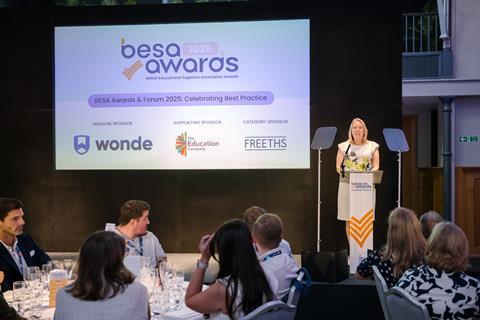The British Educational Suppliers Association (BESA) commended our core practical videos and resources for responding to the needs of the classroom

The British Educational Suppliers Association (BESA) shortlisted the Royal Society of Chemistry’s (RSC) four latest practical videos for 14–16 year-olds in their Outstanding curriculum and assessment resource – secondary category. The BESA awards took place on 10 July 2025 where the organisers announced the winners of all 18 categories. Unfortunately, we did not win our category but congratulate FlashAcademy – an English as an additional language (EAL) learning app and assessment platform.
The judges commended our videos for their accessibility for a wide range of learners and for helping teachers deliver practical lessons effectively, commenting that ‘the high quality and inclusive design of the materials make a significant and positive impact on practical science education.’ They also commented that the RSC’s ‘dedication to making chemistry practicals accessible – completely free for UK and Irish teachers through Teach Chemistry registration – is particularly noteworthy.’
Core practical videos
Covering core practicals to support flipped learning, remote teaching and live practical work, we created the materials based on extensive feedback via an online questionnaire and follow-up interviews with teachers across the UK and Ireland. We commissioned subject experts to write and review the video scripts, working with Realm Video and Matt Green – also known as the Rapping science teacher – to bring the experiments to life during filming. The four core practicals covered are Paper chromatography, Simple distillation, Rates of reaction and Enthalpy change of combustion.
You can use the videos to:
- Prepare before running the practical in class: see all the steps clearly laid out, alongside teacher and technician notes.
- Introduce your learners to the experiment ahead of time through flipped learning, for more successful practical work.
- Revisit experiment methods and results quickly and easily for consolidation and revision.
Alongside the videos you will find supporting resources including key terms, integrated instructions, pause-and-think questions and much more.
Adding value
Market research of our previous six 14–16 practical experiment videos highlighted how much teachers valued the accessibility of the videos and resources, sharing how they use the animations, closed captions, step-by-step and pictorial methods. One teacher said, ‘I love using integrated instructions and have found them to be a fantastic resource! Can we please have more?!’ So we made more for our latest 14–16 experiments, and added integrated instructions to our 16–18 practical videos on Electrochemical cells, Qualitative tests for organic functional groups and Rates of reaction too.
We also supplied teacher and technician notes, with thorough health and safety information, careers showcasing diverse role models and real-world contexts to help teachers make science relevant to young people. A survey respondent said, ‘They [the teacher and technician notes] help me to show the students what to expect, set up and help to explain the science behind the practicals and provide links to other parts of the spec/wider world.’
These videos (along with all of our teaching resources) are completely free to access for teachers and technicians at secondary schools, colleges and teacher training institutions in the UK and Ireland if you are signed up for Teach Chemistry.
Congratulations to all the winners and thank you to BESA for shortlisting our practical videos.



















No comments yet